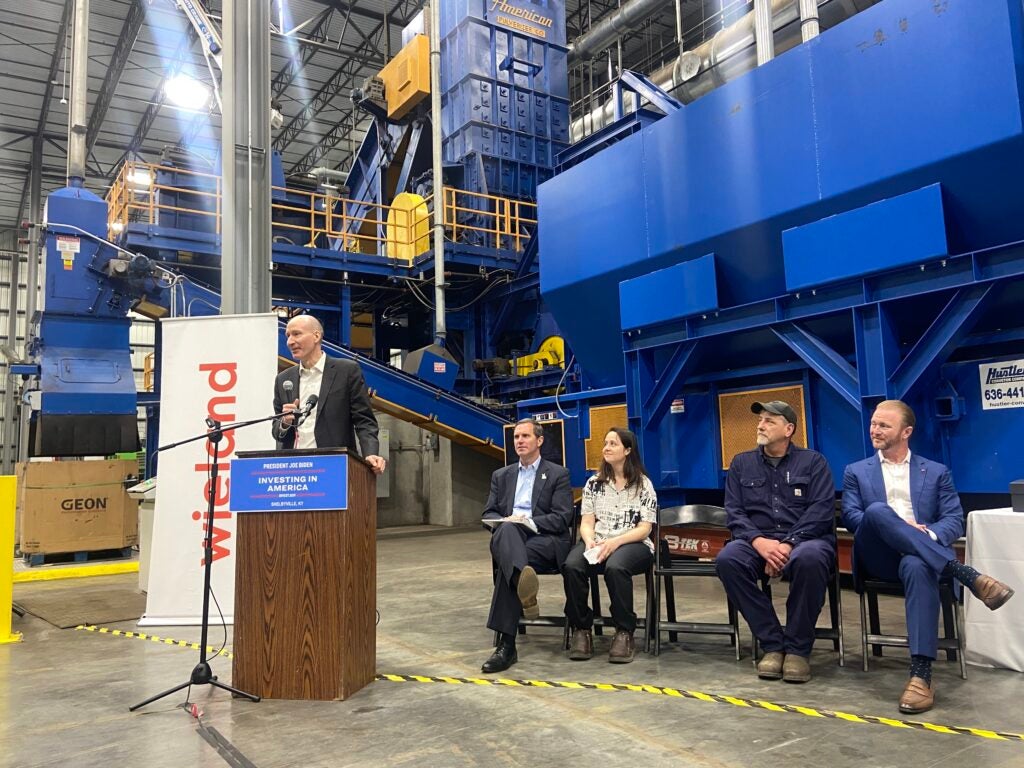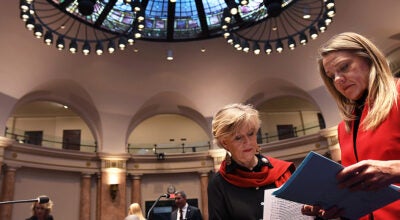Historic Shelbyville project a symbol of Kentucky’s economic development aims
Published 12:11 pm Monday, April 22, 2024

- U.S. Department of Energy Deputy Secretary David Turk talks to attendees of a celebration of a $270 million federal investment into copper scrap metal processing technology at Shelbyville's Wieland Copper Recycling Center on Friday, April 19.
SHELBYVILLE — Gov. Andy Beshear was “outraged” in the early days of COVID.
Kentucky’s health care workers couldn’t get what they needed—masks, gowns, etc.—to be safe on the job, and had to instead put their lives on the line, he said.
While it may seem entirely unrelated, Beshear opened with that anecdote at Friday’s celebration of a $270 million federal investment into copper scrap metal processing technology at Shelbyville’s Wieland Copper Recycling Center.
The historic project will allow Wieland Recycling to do something no one has done before: take copper scrap metal and convert it into high-purity copper with one of the lowest carbon footprints globally.
That high-purity copper will then be used in American manufacturing, for products like electric vehicles and semiconductors.
“It is part of our national security for the United States to make what the United States needs,” Beshear explained. “And in this era of global uncertainty, of seemingly a new conflict every week or every month, ensuring that we can take care of our own here and in this country is so critical to our future.”
Currently, about half of copper scrap generated in the U.S. is exported, and the country has to import about a millon metric tons of copper to support domestic manufacturing, said Matt Bedingfield, Wieland North America’s president of recycling.
This new technology will help solve both those problems, with an 80% reduction in carbon emissions from traditional technologies. Bedingfield said it’s a step to prepare centuries into the future.
U.S. Department of Energy Deputy Secretary David Turk made the trip to Kentucky to celebrate.
He grew up in a small Illinois community that relied on the local steel mill, Turk said. But as he grew up, he witnessed a series of layoffs and closures that left families struggling.
“The biggest thing I remember growing up was there wasn’t anybody looking out for us. There wasn’t a plan. There wasn’t a strategy,” Turk said. “…It was like we were just left up on our own to the whims of global trade and all the other kinds of things that factored into what happened in the Rust Belt in our country.”
In contrast, Turk said the Biden administration has a strategy. Not a “Washington knows best” one, but one that learns the best way forward from people on the ground, he said.
The Wieland project is one of 33 across the country part of the Industrial Demonstration Program, funded by the Inflation Reduction Act and the Bipartisan Infrastructure Law.
Through IDP, the federal government is investing $6 billion, leveraging $20 billion in overall investment through local and state matches. It’s the largest effort to clean up industry’s carbon footprint and pollution ever.
Kentucky punched above its weight, winning four of the project grants.
The others are a “green” aluminum smelter in northeastern Kentucky, a thermal battery plant in western Kentucky’s Calvert City and a second Shelbyville investment for renewable energy-powered batteries. In all, the Commonwealth won $961 million in federal grants.
Turk said Kentucky’s good fortune arose from Beshear’s vision, partnership and economic development strategy.
Beshear said the state’s investment in water and sewer infrastructure, embrace of whatever the private sector is looking for and its dedication to developing build and shovel-ready sites through programs like the Kentucky Product Development Initiative are key pieces of the economic development puzzle.
Economic development is a team sport, he said, crediting the legislature and local leaders.
Legislators just passed a final budget that will fund KPDI at $70 million across the biennium, as well as dedicate $100 million to support closing funds for mega-development projects.
Another factor in Kentucky’s success was a new Department of Energy grant criterion considering the community benefits of potential projects. It’s no longer enough to have the technology or money, Turk said. Prospective grantees must show how the project benefits more than their bottom line.
For Wieland, it starts with hiring locally for the 200 jobs the project will create.
The company will also work to develop internship programs with Kentucky’s two historically Black colleges and universities, Simmons College and Kentucky State University.
The HBCU internships ensure that opportunities reach everyone, Beshear said.
“The more we can do that with every single one of these new grants and these new projects that we announce, the better we move forward all as as one people and hopefully not have some silly legislation come up in the future,” he said. “We end up recognizing that we are better together and that diversity is a strength.”
The Wieland plant will start operations in late May.





